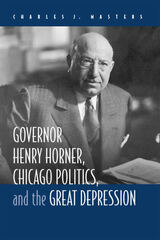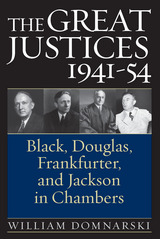105 books about Judges and 2
start with G
105 books about Judges and 2
105 books about Judges
2 start with G start with G
2 start with G start with G

Governor Henry Horner, Chicago Politics, and the Great Depression
Charles J. Masters
Southern Illinois University Press, 2007
Many have never heard of Governor Henry Horner of Illinois, yet his story is remarkable. Governor Henry Horner, Chicago Politics, and the Great Depression focuses on Horner’s career in law and politics from 1915 to 1940, while examining the economic and political dynamics of Illinois during the darkest period in American history. This principled governor managed to maintain his political integrity in a climate where honesty was a liability, says author Charles J. Masters, but the few historians who include Horner in their narratives offer contradictory and dismissive characterizations of him. Masters corrects the public record and reintroduces Horner to political lore as a man who brazenly fought both the Chicago Democratic machine that worked to plot his downfall and Roosevelt’s White House to steadfastly do right by the people of Illinois.
In this first book-length treatment of Horner in over thirty-five years, Masters traces the politician’s career, the history and politics of Chicago, and the effects of the Great Depression in Illinois. The volume details Horner’s life as a lawyer, probate judge, and two-term Democratic governor of Illinois. Horner’s relationships with President Franklin D. Roosevelt and such political players as Michael “Hinky Dink” Kenna, “Bathhouse” John Coughlin, and Chicago mayors Carter Harrison, Anton Cermak, and Ed Kelly are set against a backdrop of assassination, political sniping, court-packing schemes, Prohibition, and the New Deal.
Governor Henry Horner, Chicago Politics, and the Great Depression examines the governor’s management of the political and economic challenges of the state when millions of Americans were jobless, homeless, and hungry. The severely divergent economic and political positions of the state’s northern industrial and southern agrarian interests made the period even darker. Masters shows how Horner stemmed foreclosures, dealt with bank closings, placated unpaid teachers, soothed massive labor unrest, fed the hungry, and confronted the ever-present threat of revolution. While Hitler’s Germany was spreading Nazism throughout Europe, some Americans were questioning the fundamental order of their own political system, suggesting that socialism, communism, or Nazism could offer a better way. Masters addresses how Horner, Illinois’ first Jewish governor, dealt with these challenges to the U.S. political system.
A story long absent from the historical record, GovernorHenry Horner, Chicago Politics, and the Great Depression offers a portrait of the man, his style of governance, his successes, and his failures. The volume, with eight illustrations, effectively reevaluates Horner’s historical reputation and role in Illinois politics in the midst of the worst economic depression in our nation’s history.
[more]

The Great Justices, 1941-54
Black, Douglas, Frankfurter, and Jackson in Chambers
William Domnarski
University of Michigan Press, 2006
The Great Justices offers a revealing glimpse of a judicial universe in which titanic egos often clash, and comes as close as any book ever has to getting inside the minds of Supreme Court jurists.
This is rare and little-examined territory: in the public consciousness the Supreme Court is usually seen as an establishment whose main actors, the justices, remain above emotion, vitriol, and gossip, the better to interpret our nation of laws. Yet the Court's work is always an interchange of ideas and individuals, and the men and women who make up the Court, despite or because of their best intentions, are as human as the rest of us. Appreciating that human dimension helps us to discover some of the Court's secrets, and a new way to understand the Court and its role.
Comparing four brilliant but very different jurists of the Roosevelt Court-Hugo Black, William O. Douglas, Felix Frankfurter, and Robert Jackson-William Domnarski paints a startling picture of the often deeply ambiguous relationship between ideas and reality, between the law and the justices who interpret and create it. By pulling aside the veil of decorous tradition, Domnarski brings to light the personalities that shaped one of the greatest Courts of our time-one whose decisions continue to affect judicial thinking today.
William Domnarski is the author of In the Opinion of the Court (1996), a study of the history and nature of federal court judicial opinions. He holds a J.D. from the University of Connecticut and a Ph.D. in English from the University of California. Domnarski currently practices law in California, where he is also working on a forthcoming biography of legendary Hollywood lawyer Bert Fields.
This is rare and little-examined territory: in the public consciousness the Supreme Court is usually seen as an establishment whose main actors, the justices, remain above emotion, vitriol, and gossip, the better to interpret our nation of laws. Yet the Court's work is always an interchange of ideas and individuals, and the men and women who make up the Court, despite or because of their best intentions, are as human as the rest of us. Appreciating that human dimension helps us to discover some of the Court's secrets, and a new way to understand the Court and its role.
Comparing four brilliant but very different jurists of the Roosevelt Court-Hugo Black, William O. Douglas, Felix Frankfurter, and Robert Jackson-William Domnarski paints a startling picture of the often deeply ambiguous relationship between ideas and reality, between the law and the justices who interpret and create it. By pulling aside the veil of decorous tradition, Domnarski brings to light the personalities that shaped one of the greatest Courts of our time-one whose decisions continue to affect judicial thinking today.
William Domnarski is the author of In the Opinion of the Court (1996), a study of the history and nature of federal court judicial opinions. He holds a J.D. from the University of Connecticut and a Ph.D. in English from the University of California. Domnarski currently practices law in California, where he is also working on a forthcoming biography of legendary Hollywood lawyer Bert Fields.
[more]
READERS
Browse our collection.
PUBLISHERS
See BiblioVault's publisher services.
STUDENT SERVICES
Files for college accessibility offices.
UChicago Accessibility Resources
home | accessibility | search | about | contact us
BiblioVault ® 2001 - 2024
The University of Chicago Press









